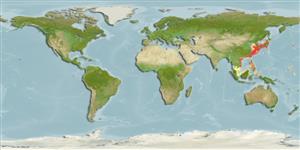Common names from other countries
Environment: milieu / climate zone / depth range / distribution range
Ecologia
marinhas demersal; intervalo de profundidade 25 - 615 m (Ref. 11230). Tropical
Northwest Pacific: southern Hokkaido, Japan southward to the South China Sea.
Tamanho / Peso / Idade
Maturity: Lm ? range ? - ? cm
Max length : 40.0 cm TL macho/indeterminado; (Ref. 559); peso máx. Publicado: 950.00 g (Ref. 40637)
Descrição breve
Chaves de identificação | Morfologia | Morfometria
Raios dorsais moles (total) : 15 - 17; Raios anais moles: 15 - 17. Lower half of the inner pectoral fin with scattered numerous pale spots (bluish in life, white or pale in preserved specimens); black blotch appears occasionally on lower inner part of pectoral fin.
Found in the tropical to warm temperate areas (Ref. 9771), in sandy or sandy mud bottom (Ref. 11230).
Life cycle and mating behavior
Maturities | Reprodução | Spawnings | Egg(s) | Fecundities | Larvas
Richards, W.J., 1999. Triglidae. Gurnards, sea robins, armored gurnards, and armored sea robins. p. 2359-2363. In K.E. Carpenter and V.H. Niem (eds.) FAO species identification guide for fishery purposes. The living marine resources of the WCP. Vol. 4. Bony fishes part 2 (Mugilidae to Carangidae). FAO, Rome. (Ref. 9771)
Categoria na Lista Vermelha da IUCN (Ref. 130435)
CITES (Ref. 128078)
Not Evaluated
Ameaça para o homem
Harmless
Utilização humana
Pescarias: espécies comerciais
Ferramentas
Relatórios especiais
Descarregue XML
Fontes da internet
Estimates based on models
Preferred temperature (Ref.
115969): 6.1 - 23.1, mean 17.9 (based on 261 cells).
Phylogenetic diversity index (Ref.
82804): PD
50 = 0.5010 [Uniqueness, from 0.5 = low to 2.0 = high].
Bayesian length-weight: a=0.00692 (0.00459 - 0.01043), b=3.06 (2.94 - 3.18), in cm Total Length, based on LWR estimates for this species & (Sub)family-body (Ref.
93245).
Nível Trófico (Ref.
69278): 3.9 ±0.7 se; based on diet studies.
Resiliência (Ref.
120179): Médio, tempo mínimo de duplicação da população 1,4 - 4,4 anos (Preliminary K or Fecundity.).
Fishing Vulnerability (Ref.
59153): Low to moderate vulnerability (30 of 100).
